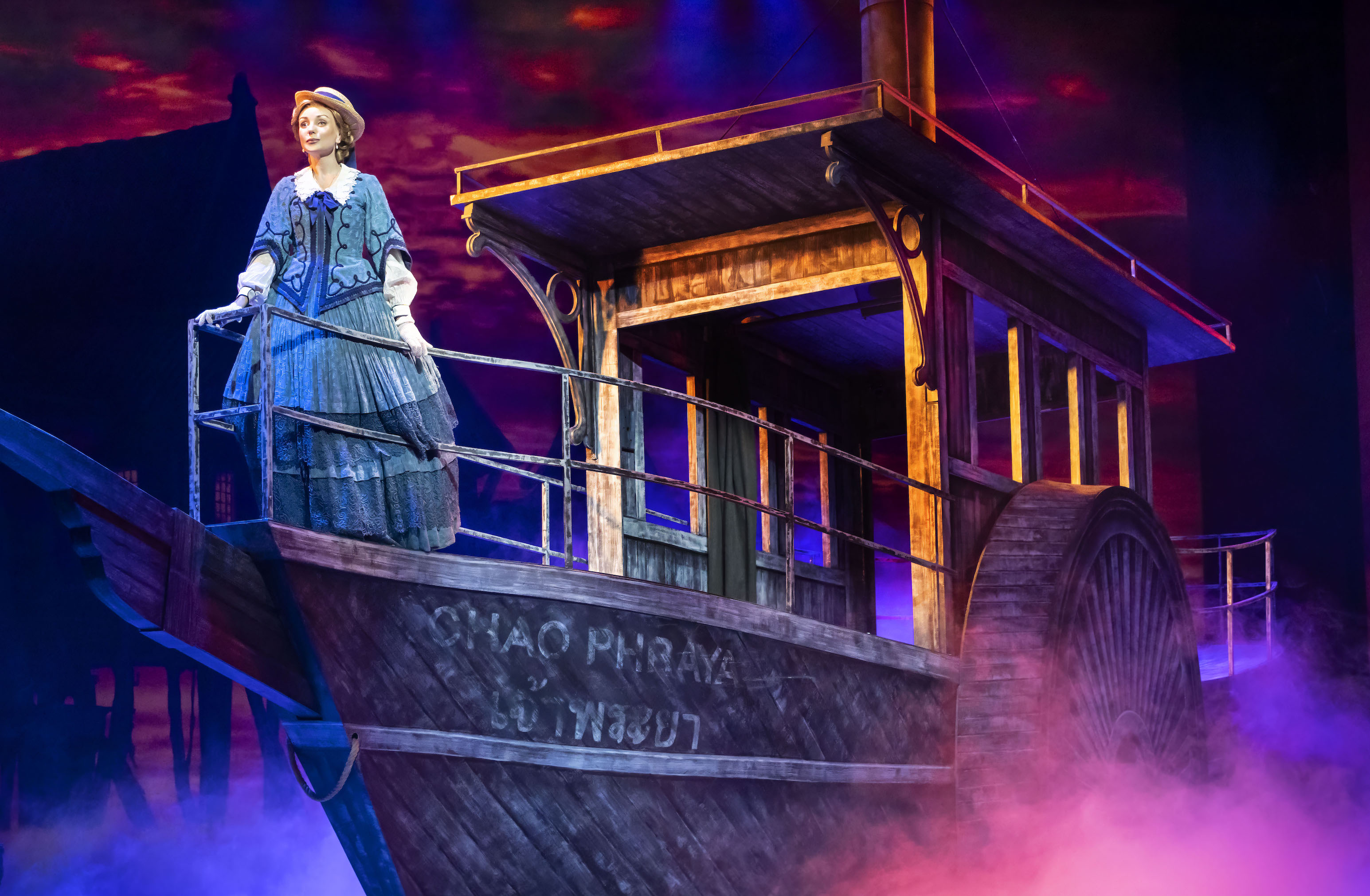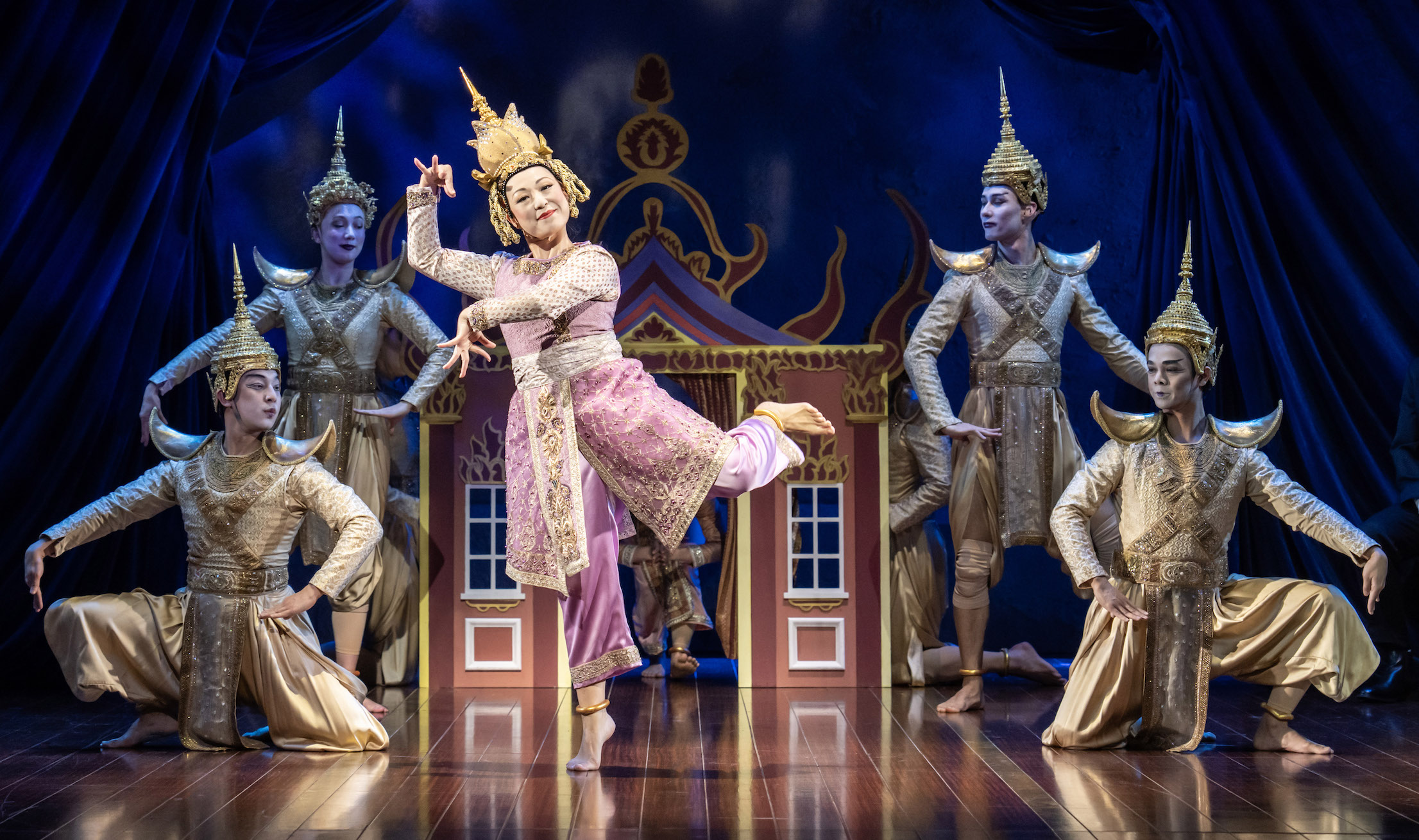The giant crinolines are back, and the winsome little royal children with miniature temples on their heads, and the glorious songs. The King and I is at the Dominion for a six-week run: how does its storyline look under a 21st century follow-spot?
Rodgers and Hammerstein’s 1951 musical, based on a 1944 novel by Margaret Landon, Anna and the King of Siam, ran on Broadway for a record three years, then became a much loved film in 1956, starring the first stage King of Siam, Yul Brynner, with Deborah Kerr as his schoolma'am sparring partner. Anna’s true age and Anglo-Indian background weren’t known at the time. In 2015, the team behind the Tony-winning South Pacific at New York’s Lincoln Center, led by resident director Bartlett Sher, decided to tackle the piece, despite new sensitivities about colonialism, cultural appropriation and “yellowface”. This is the production that has returned for a second visit to the UK.
It has possibly never looked better. With maximum efficiency, Michael Yeargan’s sets glide on and off, sometimes behind a subtly patterned panne velvet front-curtain – a paddle steamer docking in Bangkok (pictured below, right), a giant Buddha statue presiding over rituals inside the palace, curtains of hundreds of flowers hanging in its garden. Donald Holder’s lighting design comes in a sumptuous palette: golds and rich orangey-reds, skies tinted with magenta at dusk, silvery blues at night. And the costumes are impeccably opulent.
 Musically, too, the Dominion forces do it proud. Nothing can beat the pit area at Lincoln Center’s Vivien Beaumont space, which can hold a 29-piece orchestra under a retractable canopy, but MD Christopher Bundy gets a spirited performance from half that number of musicians. The familiar lovely melodies come thick and fast: “Getting to Know You”, “Hello Young Lovers”, “I Have Dreamed”, "Something Wonderful”, with heartfelt lyrics that are swept along by the musical lines. The orchestration hints at the show’s Thai setting without becoming parodic – which is in fact the overall tenor of the production.
Musically, too, the Dominion forces do it proud. Nothing can beat the pit area at Lincoln Center’s Vivien Beaumont space, which can hold a 29-piece orchestra under a retractable canopy, but MD Christopher Bundy gets a spirited performance from half that number of musicians. The familiar lovely melodies come thick and fast: “Getting to Know You”, “Hello Young Lovers”, “I Have Dreamed”, "Something Wonderful”, with heartfelt lyrics that are swept along by the musical lines. The orchestration hints at the show’s Thai setting without becoming parodic – which is in fact the overall tenor of the production.
It’s a difficult balancing act, though. This R&H piece isn’t quite as political as South Pacific, whose anti-racist stance Sher similarly didn’t play down. It has an abolitionist message at its heart, but nowadays can be more of a target for those who see it as advocating cultural colonialism. Anna, here a true-blue British widow with high-level connections, is inevitably a locus of these tensions, keen to impose her beliefs on a wholly different culture and resisting the King’s dictatorial pronouncements. But then, he has hired her specifically to inject a new “scientific”, Western approach to learning into the Siamese court, so he is more overtly where the tensions play out, a monarch at war with himself over the direction his kingdom should take.
R&H give him a historically accurate role as an astute strategist who keeps Siam out of colonisers’ hands, though don’t mention his 27 years as a scholarly Buddhist monk; they wisely turn him into a source of good humour as well, a man who likes to tease Anna by lobbing her teachings back at her, such as the way he peppers his speech with etceteras, a term she has explained to him.
The deeper value of her teaching is made clear when the crown prince, Chulalongkorn (Caleb Lagayan), wary of Anna at first, proclaims he will introduce a new leniency into royal ways, especially the edict about all heads needing to be lower than the King’s at all times – in action, this ruling too is played for comedy, the King forcing Anna further and further onto the floor, knowing she has a cumbersome panier to manoeuvre.
Darren Lee navigates the poles of the King’s personality adroitly, presenting him as both a dangerously unpredictable, potentially punitive ruler, but also as an engaging, intelligent man, whose affection for Anna is clear. Helen George’s Anna is a tad more cookie-cutter: she is happy to colour in the character within its obvious outlines and doesn’t quite inhabit it yet. When she’s being indignant and fierce, her voice drops a register and develops hints of Maggie Thatcher. But she can deliver her songs’ content effectively.
The musical honours go to Jeffrey Chekai, a honey-toned tenor training at the Royal Academy of Music, who at the performance I saw was standing in as Lun Tha, the Burmese lover of Tuptim, the King’s latest wife. HIs Tuptim, Marianella Phillips, is a rock-solid singer too, a British-Filipino soprano used to belting out anthems at Welsh rugby games. Best of all is Cezarah Bonner’s Lady Thiang, senior wife, mother of the crown prince and a wise head, which she has managed to keep on her shoulders through shrewdness and diplomacy. She has a gorgeous soprano voice and great stage presence, singing “Something Wonderful”, her astute song about the King, with perfectly controlled poignancy. A highlight of this production is Tuptim’s presentation of “The Small House of Uncle Thomas” (pictured above), her version of Uncle Tom’s Cabin. As this is her Hamlet/The Mousetrap moment, a bid to make the King recognise that his “owning” of her is wrong, we have to feel the serious intent beneath its naive narrative, which it succeeds in doing. Christopher Gattelli, basing his choreography on Jerome Robbins’s original moves, delivers a Southeast Asian-inflected style, where fingers are splayed, the porte de bras come with bent elbows and turned out hands, ditto the arabesques with bent legs and similarly turned out feet; the vocal lines, too, suddenly end in an upward shriek. As we watch Eliza (Rachel Wang-Hei Lau) run from her cruel dragon-masked pursuers, Hammerstein’s book finds an apt, fresh way to promote the liberalism at its heart without preachiness or condescension.
A highlight of this production is Tuptim’s presentation of “The Small House of Uncle Thomas” (pictured above), her version of Uncle Tom’s Cabin. As this is her Hamlet/The Mousetrap moment, a bid to make the King recognise that his “owning” of her is wrong, we have to feel the serious intent beneath its naive narrative, which it succeeds in doing. Christopher Gattelli, basing his choreography on Jerome Robbins’s original moves, delivers a Southeast Asian-inflected style, where fingers are splayed, the porte de bras come with bent elbows and turned out hands, ditto the arabesques with bent legs and similarly turned out feet; the vocal lines, too, suddenly end in an upward shriek. As we watch Eliza (Rachel Wang-Hei Lau) run from her cruel dragon-masked pursuers, Hammerstein’s book finds an apt, fresh way to promote the liberalism at its heart without preachiness or condescension.
This was never a hard-hitting, didactic work nailing the evils of empire, or of autocratic regimes, but it’s not a fluffy confection either. When it’s presented as entertainingly as it is here, it’s hard to resist.















Add comment